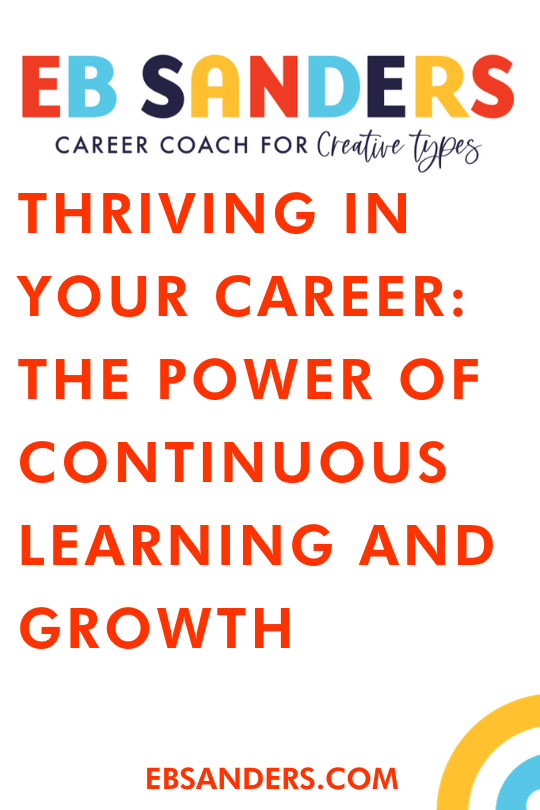This is post 9 in an ongoing series all about how to find your ideal work. To start at the beginning, head here and to get notified when the next in the series is available add your info below:
You've found a job that you love, one that also provides the financial stability you seek – congratulations! However, your journey to career satisfaction and financial success doesn't stop here.
To ensure long-term fulfillment and continued growth, it's essential to prioritize continuous learning and career development. We’re talking setting new goals, seeking feedback, nurturing your professional network and investing in education as key strategies for ongoing career success.
Set New Goals:
Stay Motivated: To maintain enthusiasm and engagement in your career, regularly set new career goals and aspirations. These goals can be short-term or long-term, but they should challenge you and ignite your passion for your work.
Alignment with Values: Ensure that your goals align with your values and what you want to achieve in your career. Setting meaningful goals that resonate with your personal and professional values can provide a sense of purpose.
Break Down Goals: Break down larger goals into smaller, actionable steps. This makes them more manageable and allows you to track your progress effectively.
Adaptability: Be adaptable and open to revising your goals as your career evolves. New opportunities and challenges may arise, and your goals should reflect these changes.
Seek Feedback:
Continuous Improvement: Solicit feedback from supervisors, peers, and mentors to identify areas for improvement. Constructive feedback is an invaluable tool for personal and professional growth.
Active Listening: When receiving feedback, practice active listening and approach it with an open mind. Avoid becoming defensive and instead focus on understanding the insights and suggestions provided.
Implement Changes: Use feedback as a catalyst for positive change. Take actionable steps to address areas of improvement and enhance your skills and performance.
Feedback Loop: Establish a feedback loop by periodically checking in with colleagues and mentors. Regular feedback discussions can help you track your progress and make necessary adjustments.
Keep Networking:
Maintain Relationships: Nurture and maintain relationships within your professional network. Staying connected with colleagues, mentors, and industry peers can provide valuable insights and opportunities.
Industry Trends: Networking allows you to stay informed about industry trends, emerging technologies, and best practices. Attend industry-related events, conferences, and webinars to expand your knowledge.
Collaboration: Collaborate with professionals from diverse backgrounds and industries. Cross-industry collaborations can lead to innovative ideas and solutions that benefit your career.
Mentorship: Seek mentorship from experienced professionals in your field. A mentor can provide guidance, share valuable insights, and help you navigate your career path.
Invest in Education:
Continuous Learning: Consider pursuing advanced degrees, certifications, or specialized training to stay competitive in your field. Continuous learning is essential for keeping your skills and knowledge up-to-date.
Professional Development: Many organizations offer professional development opportunities, such as workshops and seminars. Take advantage of these resources to enhance your expertise and capabilities.
Industry-Relevant Courses: Explore courses related to your industry on platforms like Coursera, edX, or LinkedIn Learning. These platforms offer a wide range of courses that allow you to acquire new skills and knowledge at your own pace.
Financial Investment: While education can be an investment, it often pays off in the form of increased earning potential and career advancement. Evaluate the return on investment (ROI) of educational opportunities.
Finding a job that you love and that pays well is just the beginning of your career journey.
To ensure long-term career satisfaction and financial success, prioritize continuous learning and career growth. Set new goals that challenge and inspire you, seek feedback to improve your skills and performance, maintain and expand your professional network to stay informed about industry trends and opportunities, and invest in education to stay competitive and adaptable in your field.
Remember that your career is a journey, and with dedication to continuous improvement and personal growth, you can achieve the success and fulfillment you desire.
Yours in ‘keep on learnin’ goodness-
EBS
P.S. In the final post of this series, we'll discuss the importance of work/life harmony and how to create it.
—-
EB Sanders | Career Coach for Creative Types
Unsatisfied with your work? Start HERE now!



